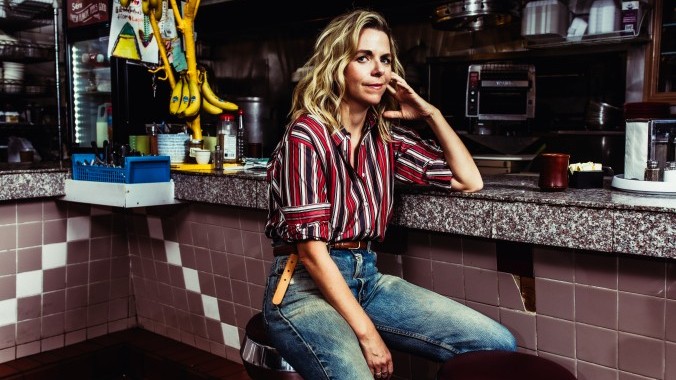Aoife O’Donovan Reckons With the Progression—and Regression—of Women’s Lib on All My Friends
"It's sad, and it's frankly embarrassing, that in 2024 women are–no matter how you cut it–basically, second-class citizens," the singer-songwriter told Jezebel of what inspired her latest record.
Photo: Sasha Israel EntertainmentMusic
Aoife O’Donovan isn’t one to sit still. Literally. In the throes of album promotion and getting her daughter to school, O’Donovan had just returned home from a run when we spoke earlier this month. It’s been two years since the prolific singer-songwriter from Massachusetts released Age of Apathy, her seventh record. Now, the Grammy-winner has returned with her first self-produced LP, All My Friends (out March 22). Timed to Women’s History Month, the nine-song collection was inspired by the passage of the 19th amendment and the progression–and in some cases, regression–of the American women’s liberation movement over the past century.
O’Donovan got her start as a founding member of Boston-bred string band Crooked Still who–almost immediately–became a fixture on the festival circuit (namely—the Newport Folk Festival and Falcon Ridge Folk Festival). She’d go on to lend a hand to the Boston Pops as well as Yo-Yo Ma’s The Goat Rodeo Sessions, among dozens of other projects, including co-founding the trio I’m With Her with singer-songwriters and multi-instrumentalists, Sara Watkins and Sarah Jarosz. As a Bluegrass Americana band, the trio was heralded for making “feminist” music, particularly their 2018 debut record, See You Around.
“It wasn’t a conscious decision to make a feminist record,” O’Donovan told The Boot that year. “My hope is that people will see I’m With Her not as a band of women, but as a band—as musicians. We hope this reaches you regardless of your gender identity or experience.”
View this post on Instagram
On All My Friends, O’Donovan’s intent—or target audience—is impossible to mistake. The record was conceived in the midst of the pandemic after O’Donovan was prompted to write a piece for the centennial of women’s right to vote. So moved was she in the process, that she then examined speeches and letters from famous suffragist Carrie Chapman Catt and soon, more than a solitary song was created. On every track of All My Friends, O’Donovan measures her own perspective as a woman and mother in the present, against those of the past.
Over Zoom, O’Donovan discussed who influenced her during the making of All My Friends, what “friends” she collaborated with, and how she’s keeping hope alive despite the country’s converging crises in another presidential election year. This interview has been edited for length and clarity.
JEZEBEL: There are a lot of voices on All My Friends–from the San Francisco Girls Choir to those from history like suffragists like Carrie Chapman Catt. Tell me about how it all came together.
-

-

-

-

-

-

-

-

-

-

-

-

-

-

-

-

-

-

-

-

-

-

-

-

-

-

-

-

-

-

-

-

-

-

-

-

-

-

-

-








































